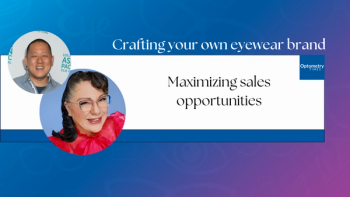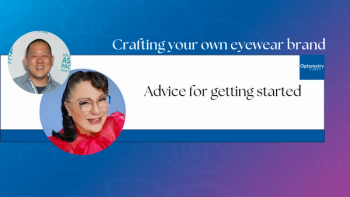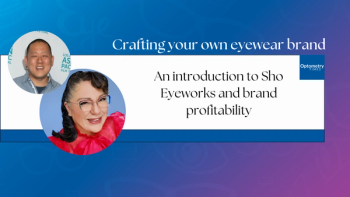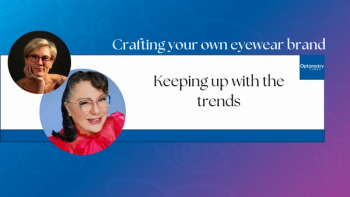
- September digital edition 2022
- Volume 14
- Issue 9
Warm starting your dream optometric practice

Adam Ramsey, OD, discusses his recent book titled, "Play Chess Not Checkers: The Practical Guide to Warm Start Your Dream Optometric Practice."
Adam Ramsey, OD, CEO of
He shares how personal experience of opening his own practice influenced him to write the book, the first step ODs should take to starting the process of opening their own private practice, and offers a sneak peek at what readers can take away from their readings.
For a full transcription of this interview, see below.
Note: this has been lightly edited for clarity.
--------
Alex Delaney-Gesing: Where did the inspiration for the title, Play Chess, Not Checkers, come from?
Adam Ramsey: So I read a lot of podcasts and a lot of books and articles. I was opening my own practice, and I felt like the big boys were making moves on a board that I could not make.
So to think of the concept … when I was younger, I played chess and checkers. I play a little bit now, but not as much as when I was a kid. Chess and checkers are both played on the same type of board. The only thing different is the pieces.
So I looked at it like the small businesses were playing checkers, where you can only move one piece at a time. And the big businesses were playing on the same board in the same world that I'm in. But they were playing with chess pieces that could jump so much further than my checkers pieces and could make moves in the L and diagonal and make moves that I physically could not make, even though we were still operating on the same board. And I felt that was a little unfair.
So I said, “I need to learn the rules to the game and make sure that we're playing with the same even playing field and start playing chess with them,” instead of what I feel small businesses are doing, which is playing checkers on a chessboard.
Delaney-Gesing: What would you say the difference is between cold starting and warm starting a practice?
Ramsey: So that's just my kind of play on words there, in that a cold start is if you start with no patients; just open your practice and say good luck. A warm start is if you get a running start; you know, it's kind of like if you warm up the engine, if you do some prep work ahead of time so that when you start, you start and you're successful from the beginning. Because a cold start, in my mind, means I'm going to be broke and unhappy for a long, long time.
And a warm start is: I'm starting with some patients either following me from another practice, I have done some marketing in advance where I have a backlog of patients that are looking to get my services in that area—if I created and drummed up some buzz about the opening of this practice—or if I'm going into an area where there's a need. Because if you solve a need, you don't have to be that good. Because that community needs the services that you're selling.
Think of it like, if you sell umbrellas—but you live in Arizona—you probably be very unsuccessful. But if you sold umbrellas, but you live in Seattle, you can be a millionaire. So it is not the actual sale of what you do for a living that determines your success. It is your services of what you do for a living in a community that actually needs or wants your services.
So make sure that where you're going, they actually need or want your services. You don't have to be the best umbrella salesman in the world. But if you try to sell umbrellas in Arizona, or Nevada—Las Vegas—you're going have to have some charisma that's out of this world for me to want to buy an umbrella in a climate that barely rains.
But you know, that's what happens. Sometimes some people try to sell umbrellas in Vegas. And you're going have to be very good to do that. And I would suggest against that because most people don't have that much charisma to survive an umbrella business in Vegas.
Delaney-Gesing: How did your own personal experience of starting a practice influence you to write this book?
Ramsey: Before I opened, I read every single book about business in optometry that was on the market. I went on Amazon, and I Googled, and there were about 6 or 7 books that said optometry and business in some form or fashion. I bought all of them and read them twice. I listened to all the podcasts, [watched] all the YouTube videos, I asked all the questions I could ask. And then I was like, “Okay, I know as much as I can know. Nothing else I could do but to do it. So just let's just go.”
I opened my practice. A year-and-a-half later, after I open, I was hit with a cease-and-desist letter from a major corporation saying that I had to change my name from my Eyeconic Care to something else. And then I changed it to Socialite Vision. And I got that name trademarked because the company was using and had the trademark of Eyeconic and they said I had to change it. And after that I kicked myself for months, being like, “You're supposed to be so smart, you're supposed to be this know-it-all, and you didn't know nothing about trademarks. And you didn't know you needed to get your name trademarked.”
But then at the time, I was the president and of all the optometrists in my county. And I stood in front of all of them, asked them at a meeting. I said, “Hey, how many of you guys have your names to your business trademarked?” And it was 140 people in the room. And not one of them had their name trademarked. So then I sat and I said, “Okay, Adam, you didn't do anything wrong. You just did what everybody else did. Nobody else trademarked their name, you know, because you weren't planning on starting a clothing business with it. So there's wasn't really a need to trademark, because I wasn't selling my name on a product or something like that.” So why would I get a trademark?
Then I thought to myself, “Well if I read all the books that were out there, and it wasn't available in the books, then maybe I should tell those people that write books, ‘hey, you should do a chapter on trademarking.’”
And then I sat there and said, “But they never went through what I went through. So how can they write a book about an experience they never had? So why don't you just write the book and let other people know instead of telling somebody else to write a book on something that they never experienced?
So that day, I started writing Play chess, not checkers. And I literally wrote it a couple pages a day, every day, for about a year. And then just said, “Okay, I wrote it.”
I thought I didn't have enough in the book. And somebody says … I said, “Well, I got about 100 pages.” And they were like, “On [Microsoft] Word?” I was like, “Yeah.”
They said, “Do you know … that's a lot of pages for a book, because it's much smaller than a page.” And I was like, “Oh, for real?” “Yeah, that's like double spaced. “I thought I didn't have enough. I had a book already and I didn't even know; I was sitting on it for 6 months after I had paused. And somebody else was like, “Oh, look at all the books you got. Look at how many pages there are. It's like 40 pages. And some of these books are 80 pages.” And I was like, “Oh, I got that.” And I put the book out by 6 months after I got the revelation.
Delaney-Gesing: What would you say the first step is in starting the process of opening up a private practice?
Ramsey: Finding a need in a community that needs. Make sure you're meeting the need. If you're wanting to do a kid's practice, don't do it in a retirement community. So find a need.
And the first step is … do the people in the area need the services I want to provide? I think finding the need is the most important thing.
And then the next step would be: why do you want to open your own practice? Because the why is really important. It's not going to be all roses and it's not going to be all perfect.
So if you don't really determine why you want to go through all this work, then you're never going to reach the heights that you want to. And when the going gets tough, you may quit and give in because you're doing it for the wrong reasons.
But if you're doing it for the right reasons, or you are comfortable with the reason you did it— and you knew this was the only way to accomplish it because you've done your research—then when it's not all perfect, it's not that bad. Because you're able to be happy in your decision.
Delaney-Gesing: Without giving too much away, could you offer a breakdown of how your book is set up for readers?
Ramsey: So when I read all the other books on the market, the other ones are structured as though you have a million dollar business and how to help you get to a $10 million business.
I read them and there was some value to those books. But who was helping the person that starts from scratch? What is step one? And how do I get to the million?
So my book is set up to say, if you know nothing about opening on practice, I can get you from knowing nothing to your doors being open. And then you can read the other books that are out there, and they're going teach you how to grow that practice once you actually have it.
But this book is literally just trying to get you open. And that's what most people actually need, is help in the beginning. Once you get the ball rolling, you can kind of figure it out along the way. But most people struggle with is the beginning part; getting open.
Delaney-Gesing: What can readers expect to take away from your book?
Ramsey: I hope they take away that anybody can have a private practice, if you want it. Some people think they have to have an MBA or a lot of money. Some people think they have to be perfect doctors, they have to do this after that. It's so difficult. And I would say it's not as difficult as you think if you're doing it for the right reasons.
If that's what makes you happy, then the amount of work won't seem like too much work. Like people that don't like flying. If they had to fly for work, they complain. But if I said you were flying, but you're going to Hawaii, you may not complain so much, because you're doing it because you want to. So it isn't the flight that annoys most people; it's flying because somebody else wants you to do it, not because you want to.
So if you're doing it for the right reasons, and your why is secure, the end goal will make you happy. But you have to know that in the beginning,
Delaney-Gesing: Is there anything I didn't ask you that you'd like to touch on?
Ramsey: I would say, for those that are listening and watching this: believe in yourself, you are enough. Don't think you need or if you just had this or you did this or if you were here, then you can be successful. I was you; I was in your shoes working at a commercial place and was trying to figure out a way to get out of that rat race and be able to control my own destiny and my own stuff.
So my challenge to anybody watching is that if you want to be your own boss, and you want to create an experience for your customer and your patient that is different and unique—your own secret sauce—then you can do that. You don't have to do it the way other people do it; you can be successful your own way.
It doesn't have to be the Adam Ramsey show. It doesn't have to be anybody else's vision. It needs to be your authentic vision of how you want to be successful. And you can be successful a lot of different ways if you have some clarity in what you're doing and why you're doing it. You can be happy doing it.
I know a doctor who only works from 9 am to 2 pm. She works when her kids are at school. She drops them off the school comes and sees patients, and she goes and picks them up from school and goes home. And she closes in the summer. And she closes during spring break. And she's living in her purpose because her why is secure. She could never work from somebody else and have that schedule.
So if you know why you're doing it, and you're doing it for the right reasons, you can create your own destiny and create your own happiness. And for somebody else that might seem crazy and say, “Oh my God, you're not working for 2 months? You’re going t close at 2 in the afternoon?” And she says, “Yes, because I got into this business to work for myself, and to help patients, but I'm helping patients on my own schedule. But I'm more important about being there and being present for my family.”
And she created a business that works to her schedule—not the other way around. Her kids aren’t waiting on her; her businesses is waiting on her to get there when she's done with her family time. And there's a whole lot of ways to be successful. And her idea of success is going to be different than mine. Because she can make less money, but she's happy.
And at the end of the day, we should all be striving for happiness. If you can be happy, however that happiness is to you, let's just all be happy.
Articles in this issue
over 3 years ago
Help your practice rank higher in local Google searchesover 3 years ago
A look at the latest lenses on the market and their modalitiesover 3 years ago
Higher-order aberration correction with scleral lensesover 3 years ago
Importance of communication between providersover 3 years ago
What to know about new topical presbyopia-correcting dropsover 3 years ago
Supplements slow AMD progression, study data confirmover 3 years ago
Welcome to the EVO-lutionover 3 years ago
Dry eyes: A price to pay for clear skin?Newsletter
Want more insights like this? Subscribe to Optometry Times and get clinical pearls and practice tips delivered straight to your inbox.




























